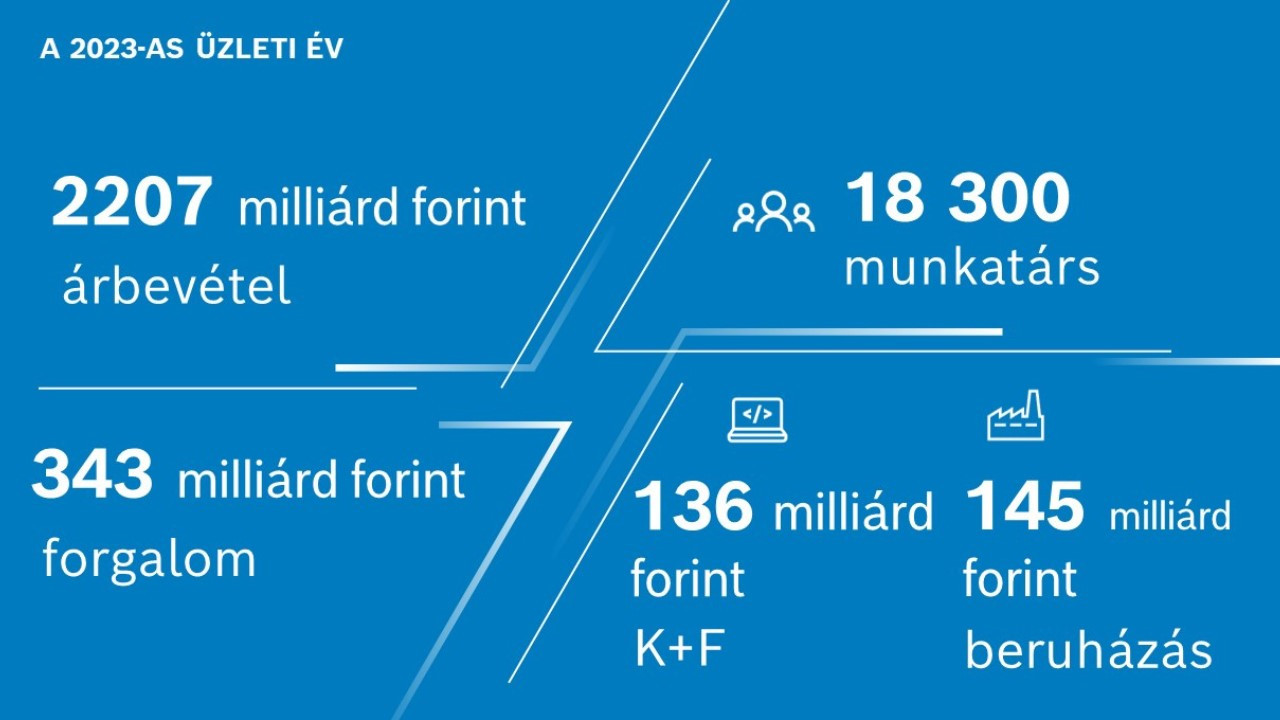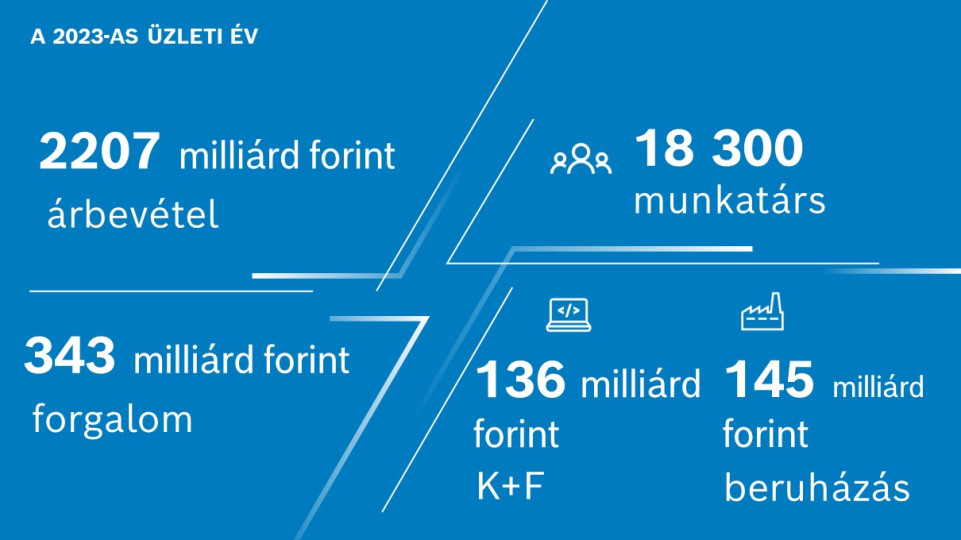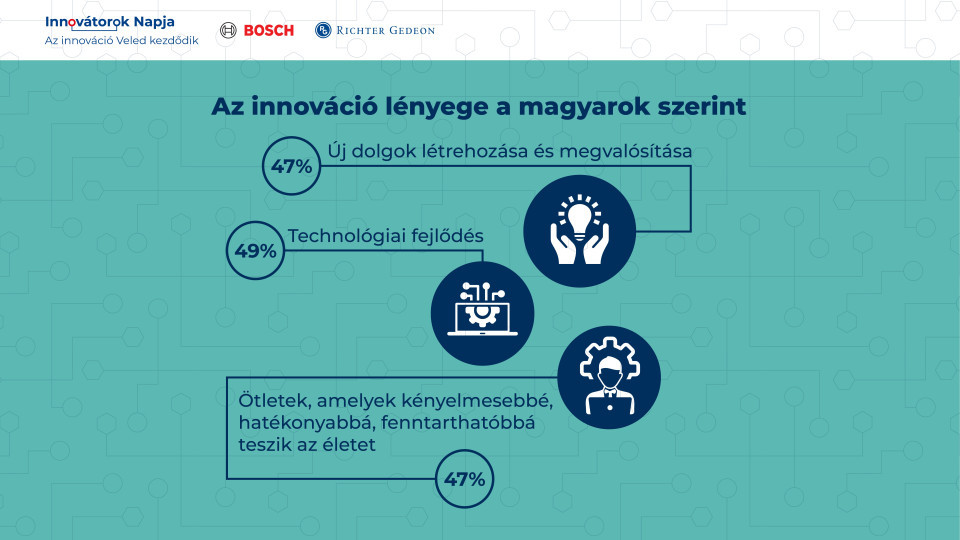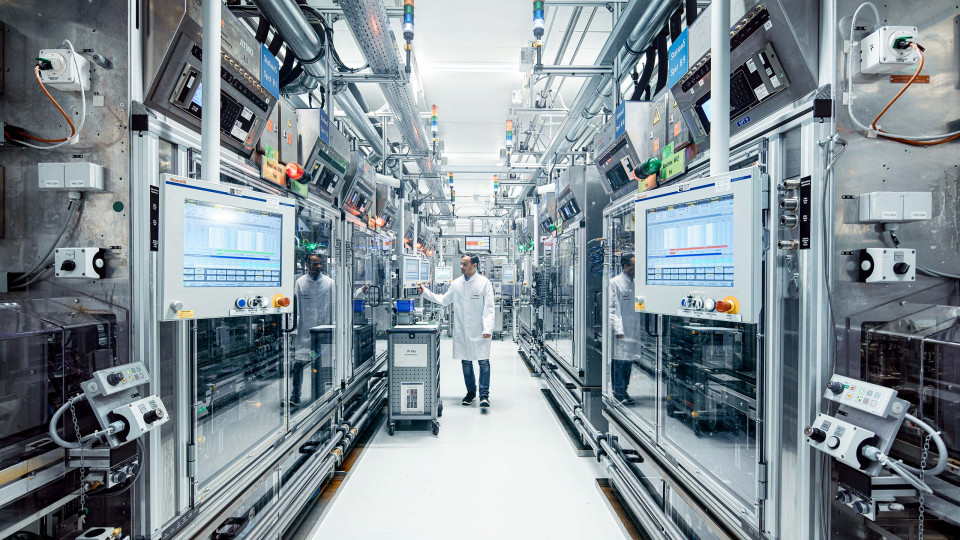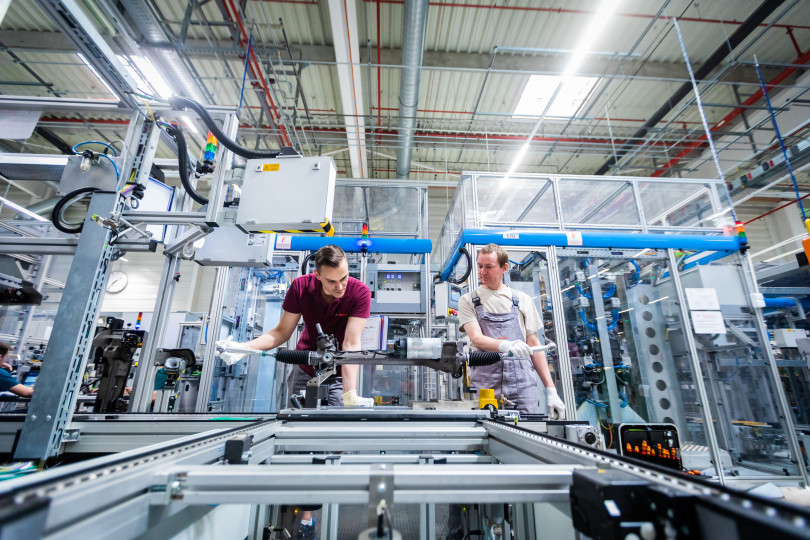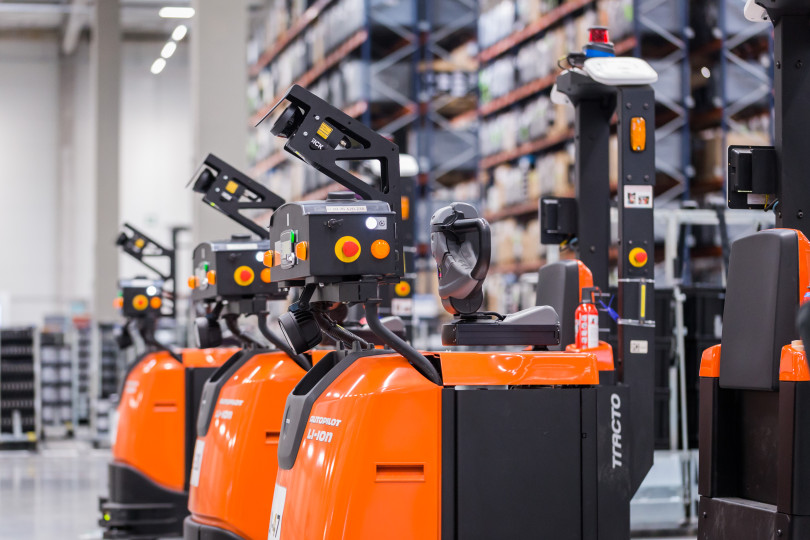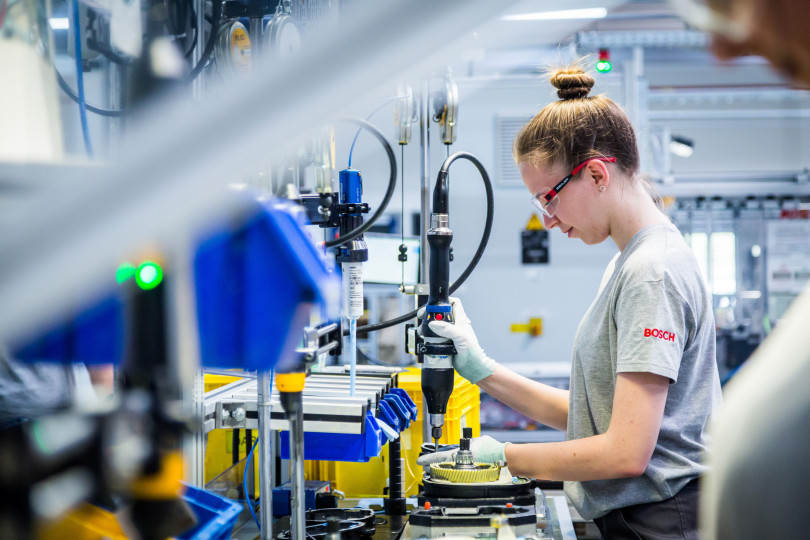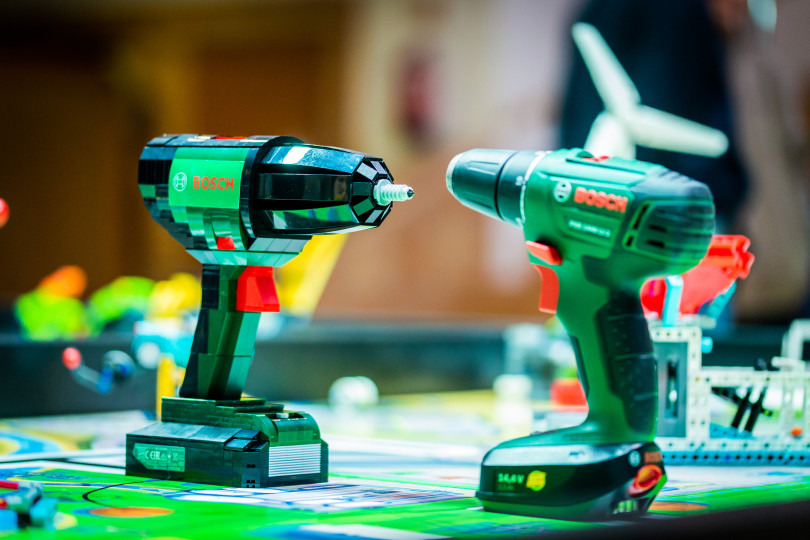Budapest – Bosch, the global supplier of technologies and services, achieved total net sales of 2.207 billion forints in Hungary in 2023, including sales of non-consolidated companies and internal deliveries to affiliated companies, despite unfavourable global economic trends. This is a stable result compared to the already high achievement in the previous year. In 2023, the Bosch Group’s consolidated sales in the Hungarian market – sales revenue from sales to third parties – rose by 9 percent in local currency to 343 billion forints.
The investment in research and development amounted to 136 billion forints and is thus 21 percent higher than in the previous year. In addition, Bosch continued its already started investments in Hungary, spending 145 billion forints last year to serve its partners using the most modern technologies and tools. At the end of 2023, the number of associates at Bosch in Hungary remained stable and stood at more than 18,300 associates, 3,900 of which work in research and development.
“Technological development is accelerating at an enormous pace around the world, the application of the latest and most modern solutions opens up completely new horizons in industry, transport and households alike. At Bosch, we work continuously to develop technologies of the future which make everyday lives of people easier. We are able to perform outstandingly thanks to these innovations and the dedicated work of the Bosch community. I would also like to thank all our employees and cooperating partners for this,” said István Szászi, representative of the Bosch Group in Hungary and in the Adriatic region. “In 2024, we expect another challenging year as we have to react to the changing market environment with quick adaptation in a subdued economic environment. We count on the further cooperation with our partners in this,” he added.
Bosch focuses on the development and production of the mobility of the future
The Bosch Group in Hungary also focuses on areas shaping the future during its development and production activities, especially on electromobility, autonomous vehicles, artificial intelligence and industrial digitalization.
Robert Bosch Elektronika Kft. in Hatvan is the company’s largest mobility electronics plant, where besides steering control and driver assistance systems, the manufactured components dynamically turn towards future-oriented, complex and state-of-the-art electromobility. The production of several new power electronic solutions for electric vehicles began in 2023. According to Bosch expectations, 70 percent of all new cars in Europe will likely be purely electric by 2030.
At Robert Bosch Energy and Body Systems Kft. in Miskolc, which deals with the development and production of automotive components and electric drive systems, the production of innovative blower motors has begun, and the turnover of new-generation engine cooling fans has increased significantly. ABS final assembly has started for electric bicycles in the eBike Systems division. New automated production lines were put into operation in the eBike Systems division at Robert Bosch Power Tool Kft., also in Miskolc, a manufacturer of power tools and eBike batteries. The construction of the joint warehouse of the two Bosch companies in Miskolc is progressing according to plans, with which they will be able to switch to automated logistics processes that are more efficient than before. The handover of the logistics centre is expected in the second half of 2024.
The serial production of the latest generation electric power steering systems for premium sports cars was started last year at Robert Bosch Automotive Steering Kft. in Maklár, which deals with the production and development of automotive components. The turnover of electric steering systems for commercial vehicles (Servocom) also ramped up, the serial production of which started in 2022. The largest expansion is expected in the production of electric power steering systems this year.
By 2025, all Bosch products will incorporate artificial intelligence or be developed or produced using it
Bosch places great emphasis on the use of artificial intelligence. Artificial intelligence plays the most important role in production at the Hungarian sites, among other things in the data analysis required for production optimization, in the control of processes and in the planning of maintenance of production lines. For example, artificial intelligence supports error analysis of eBike production lines and identifies the cause of deviations in Miskolc. Statistical correction was introduced in sensor production in Maklár, which increases efficiency and makes the work of process supervisors easier.
Bosch also assigns a special role to artificial intelligence in its educational cooperations, which is part of the joint work with the ELTE-Bosch Artificial Intelligence Industrial Department, the Bosch-BME Innovative Vehicle Technology Competence Center, the Budapest University of Economics and the University of Miskolc.
The Bosch x Richter Day of Innovators event focused on artificial intelligence last year. The goal of the cooperation, which was launched for the first time in last September with the aim of creating a tradition, is for the two decisive Hungarian innovative companies to jointly inspire present and future generations to build a more sustainable and safer future. Expanding the cooperation, the Bosch Group in Hungary and Richter Gedeon Nyrt. launched a joint innovation tender this year. Higher education students applying for the Bosch x Richter Industrial Innovation Award can present innovative solutions to today’s social and economic challenges in the field of healthcare and mobility.
Education remains an important element of Bosch’s strategy. Universities can learn about industry trends first-hand in Bosch’s research and development ecosystem, so that they can support the development of technology even more efficiently. Bosch can strengthen its research with the joint projects, and students can get involved in industrial developments already during their university years.
Bosch Group: outlook for 2024 and strategic course
The Bosch Group increased its sales and earnings in 2023 and is successfully implementing its growth strategy despite a difficult environment. Stefan Hartung, chairman of the board of management of Robert Bosch GmbH, said: “In the 2023 business year, we achieved our financial targets and strengthened our market position in a number of business areas, from semiconductors to integrated building systems.” The company increased its sales by 3.8 percent compared to the previous year to 91.6 billion euros despite unfavorable economic and market conditions. At 5.3 percent, the EBIT margin from operations was 1 percentage point higher than the previous year. It was therefore higher than expected, but still lower than the target margin of at least 7 percent required over the long term. Bosch wants to achieve this by 2026. In the first quarter of 2024, sales were down by more than 0.8 percent year on year; after adjusting for exchange-rate effects, this amounts to an increase of 2.7 percent. However, the company expects that it will be difficult to increase the EBIT margin from operations compared to the previous year. In addition to the subdued market environment and the expected further increase in upfront investments in areas of strategic importance, restructuring and process improvements will also have a negative impact at first, with their positive effect coming only after a delay. Even if the economic and social environment remains demanding, Bosch aims to rank among the top three suppliers in its key markets in all regions of the world. “We’re pursuing innovations, partnerships, and acquisitions to ensure we grow as our industries transform – despite economic headwinds,” Hartung said.
In its core mobility business, for example, Bosch is systematically driving forward strategic decisions for future growth. This year alone, it is launching some 30 production projects for electric vehicles. In the growth area of hydrogen, Bosch has reaffirmed its business expectations: by 2030, its sales with hydrogen technology could reach 5 billion euros. Bosch is also systematically exploiting growth opportunities in the area of heating technology. Although the heat-pump market stagnated across Europe in 2023, Bosch was able to grow its business by almost 50 percent. In the years ahead, Bosch will continue to grow significantly faster than the market in this segment. However, there could be a slight improvement in the consumer goods markets after two years of consumer restraint. Bosch expect its own business to stabilize, to which innovations as well as the expansion of its international footprint should contribute. Overall, climate action continues to play a central role for Bosch. In Hartung’s view, it offers great opportunities for growth, even if markets such as electromobility are not developing as fast as expected. Nonetheless, Bosch is continuing to make heavy upfront investments in technologies for a carbon-neutral future, in order to help shape this transformation from the top. “There is pressure to cut subsidies for CO2-efficient technologies. But climate action requires sustained investment – from government, from companies, and from each and every one of us,” Hartung said.
Mónika Hack
+36 70 510 5516
Bosch has been present in Hungary since 1898 with its products. After its re-establishment as a regional trading company in 1991, Bosch has grown into one of Hungary’s largest foreign industrial employers with currently eight subsidiaries. In fiscal 2023 it had total net sales of 2.207 billion forints and consolidated sales to third parties on the Hungarian market of 343 billion forints. The Bosch Group in Hungary employs more than 18,300 associates (as of December 31, 2023). In addition to its manufacturing, commercial and development business, Bosch has a network of sales and service operations that covers the entire country.
The Bosch Group is a leading global supplier of technology and services. It employs roughly 429,000 associates worldwide (as of December 31, 2023). The company generated sales of 91.6 billion euros in 2023. Its operations are divided into four business sectors: Mobility, Industrial Technology, Consumer Goods, and Energy and Building Technology. With its business activities, the company aims to use technology to help shape universal trends such as automation, electrification, digitalization, connectivity, and an orientation to sustainability. In this context, Bosch’s broad diversification across regions and industries strengthens its innovativeness and robustness. Bosch uses its proven expertise in sensor technology, software, and services to offer customers cross-domain solutions from a single source. It also applies its expertise in connectivity and artificial intelligence in order to develop and manufacture user-friendly, sustainable products. With technology that is “Invented for life,” Bosch wants to help improve quality of life and conserve natural resources. The Bosch Group comprises Robert Bosch GmbH and its roughly 470 subsidiary and regional companies in over 60 countries. Including sales and service partners, Bosch’s global manufacturing, engineering, and sales network covers nearly every country in the world. Bosch’s innovative strength is key to the company’s further development. At 136 locations across the globe, Bosch employs some 90,000 associates in research and development, of which nearly 48,000 are software engineers.
Additional information is available online at www.bosch.hu, iot.boschblog.hu, www.bosch.com, www.iot.bosch.com, www.bosch-press.com, www.twitter.com/BoschPresse

